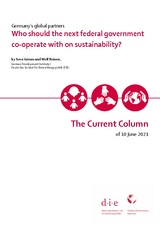The Current Column
Germany’s global partners
Who should the next federal government co-operate with on sustainability?
Grimm, Sven / Wulf ReinersThe Current Column (2021)
Bonn: German Development Institute / Deutsches Institut für Entwicklungspolitik (DIE), The Current Column of 10 June 2021
”Future-oriented policy invests in the development of multilateral standards and regulations and focuses on multilateral co-operation, further supported and flanked by bilateral and European co-operation.” In their column on the 2021 Bundestag elections Anna-Katharina Hornidge and Imme Scholz emphasise the importance of international collaboration aimed at the global common good. What partners does Germany need, and what partners need Germany in order to tackle the global challenges of the 2020s?
Germany is not the only country faced with managing course-setting issues concerning the future: the manner in which we do business, consume and are mobile needs to take planetary limits into account. Major challenges such as climate change or the COVID-19 pandemic can only be tackled using approaches agreed beyond national and political boundaries. The German government also stresses global interdependencies and the necessity of co-operation in its White paper on German multilateralism (May 2021).
Independent of party-political considerations, the need for joint action at global level as well as with central bilateral partners is set to increase further in the coming legislature period.
Global partners beyond the OECD countries
Germany finds the most important partners for addressing cross-border issues in the European Union and in the transatlantic relationships, complemented by the OECD states. In the majority of cases fundamental values can be expanded within this group, even where these are called into question by populist groupings. However, co-operation for the global common good needs to extend beyond the OECD world if it is to be effective.
Over the past two decades a number of states from the “Global South” have emerged both economically and politically. Maintaining and improving human living conditions worldwide makes these countries essential as co-operation partners, whether it is due to their extensive (and still growing) economic strength and accompanying CO2 emissions (China, India), forestry resources of significance for climate policy (Brazil, Indonesia) or the relevance of being an industrial policy role model in their respective region (Mexico, South Africa). Frequently it is a mixture of these factors. In addition, these states are also exerting their influence regionally and globally, for example via their involvement in third countries or in security and financial institutions such as the Shanghai Cooperation Organisation (SCO) or the New Development Bank, which they have initiated (NDB; the BRICS bank).
Necessary, but not necessarily like-minded partners
Despite national development agendas with own sustainability goals, these states do not necessarily have similar interests or the same values criteria as Germany and the EU. Nevertheless, they are essential for globally viable problem solving. The dependability of commitments on the basis of agreed interests is decisive for international co-operation under these prerequisites. This requires interaction – especially – with those with deviating outlooks, in a broad dialogue with societies, not just governments. Development policy has extensive experience in this respect. Different values systems should not be an obstacle to dialogue, for example when tackling climate change.
Beyond financial transfers
The major states of “the South” (as self-definition) see themselves as natural partners when it comes to addressing global issues. Thinking within the category of “development aid payments” is restrictive and unsuitable here. There is a need for sturdy co-operation formats with contributions from all sides. Beyond the climate focal point directly related fields such as renewable energy and energy efficiency, biodiversity, resource management as well as research and training are to be addressed. The exchange of experiences and common knowledge of problems and potential solutions form the core of this.
As leverage from financial support is declining in view of the economic progress in these countries, globally relevant knowledge co-operation represents an important field in which to work towards the global common good together. Co-operation succeeds in the areas in which knowledge – research as well as procedural experiences of various groups – is in demand and often needs to be jointly established first.
Working across governmental portfolios and embedded in the EU context, the next German federal government should therefore invest more in applied research with diverse actors and their cross-border networks in the Global South.
This text has been publish as part of the series „Impulses for the Bundestag election”.



